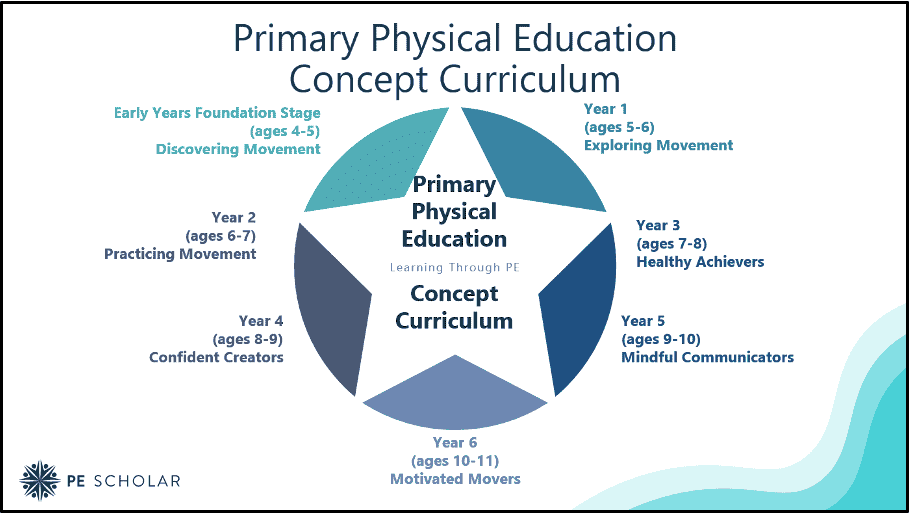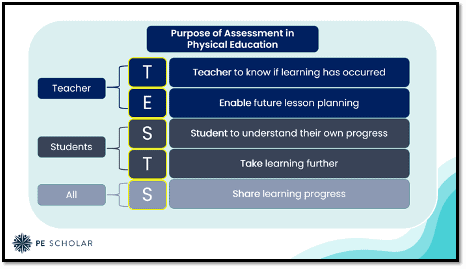
Introduction
Effective communication is a crucial skill that extends far beyond PE. As primary physical education (PE) teachers, our role encompasses not only teaching and learning through the physical domain but also fostering essential holistic skills such as teamwork and communication. In this blog, we will delve into a Year 5 Outdoor Adventure Activities (OAA) lesson that focuses on communication within a team. We aim to offer valuable guidance for primary PE teachers seeking to deliver the Primary Concept Curriculum effectively.
The Purpose of Assessment
Before we dive into the details of the outdoor adventure activities lesson, let’s address an important aspect of teaching – assessment. Assessment shouldn’t simply be a numeric evaluation of a student’s performance. Instead, it should serve as a tool for understanding the learning journey. This concept aligns with the primary concept curriculum, which emphasises holistic development.
We should recognise the difference between formative and summative assessment. Formative assessment is the journey of learning and summative assessment is the final result. Using formative assessment enables teachers to adapt and plan future lessons based on their observations. Conversely, summative assessment is the final evaluation determining overall achievement. We should use formative assessment to inform summative judgements. To learn more about the purpose of assessment, check out this blog. The ‘TESTS’ image was created to support teachers understand the true purpose of assessment in PE and how it can and should be owned by everyone.

Opportunities to Develop Physical Competence in the Lesson
1. Physical Activity and Exercise: The entire lesson is centred around physical activities and exercises. From building an igloo using hoops to engaging in an equipment relay and constructing various structures, students are actively moving and engaging their bodies throughout the lesson. This not only promotes physical fitness but also provides an enjoyable and practical way for students to apply their physical skills.
2. Motor Skills Development: The lesson involves activities that require students to use and develop their motor skills. Whether it’s carrying equipment without using their hands or constructing structures with specific materials, students are honing their fine and gross motor skills. These skills are fundamental for a child’s physical development.
3. Coordination: Effective teamwork in activities like the igloo building and equipment relay necessitates coordination among team members. Students must synchronise their movements, communicate clearly, and work together to achieve their goals. This enhances their physical coordination and ability to collaborate effectively.
Lesson Overview
The Year 5 OAA lesson we’re about to explore revolves around teamwork and communication, skills that transcend the boundaries of PE class. The lesson encourages the use of various activities to instil these skills in students.
Activity Overview
1. Igloo Building: The lesson begins with an energizer activity – igloo building. Students work together to construct a structure using hoops. This activity not only promotes teamwork but also requires effective communication, as team members must coordinate their efforts to create a stable structure.
2. Equipment Relay: The second suggested activity is an equipment relay where students must pick up objects from point A and transport them to point B without using their hands. This activity encourages students to find creative ways to communicate and collaborate to achieve their goal.
3. Building Challenge: The highlight of the lesson is the building challenge. Students are tasked with constructing a tower, den, or a replica of an object using provided materials. This activity fosters teamwork and communication as students must plan, strategize, and problem-solve together. It also provides opportunities for assessing individual and group progress over time. Communication is Key
Throughout the lesson, the importance of communication becomes evident. Whether it’s deciding how to build a stable igloo, coordinating movements to transport equipment, or collaborating on a complex building project, effective communication is the linchpin of success. This lesson provides students with a safe environment to develop these skills.
Discovery
The discovery questions are a valuable tool that enable important opportunities for reflection at the end of the lesson. These questions encourage students to reflect on their experiences and learning outcomes. Questions like “What did your team do to make you feel valued in today’s lesson?” and “How will you use the learning from today’s lesson elsewhere in your school?” prompt students to think critically about the importance of teamwork and communication not only in PE but also in other areas of their education and life.
Conclusion
Primary PE teachers have a unique opportunity to impart valuable character development skills such as communication and teamwork. The Year 5 Outdoor Adventure Activities lesson showcased in this blog demonstrates how these skills can be effectively integrated into the curriculum.
As we strive to move away from mere summative assessment towards a more holistic understanding of learning, lessons like these serve as shining examples of how to achieve that goal. By providing students with opportunities to learn and grow through practical experiences, we empower them with skills that will serve them well in PE and possibly beyond.
Further curriculum ideas and resources
At PE Scholar we aim to provide high-quality materials and expert knowledge to make your teaching that bit easier. Below are some further resources and insights to support you with your PE curriculum.
Further lesson walkthroughs: Early Years, Year One, Year Two, Year Three, Year Four and Year Six
The Primary Concept Curriculum insight
PE curriculum design guest blog
Concept curriculum lesson templates
Concept curriculum non-performer worksheet
Mapping your PE Curriculum resource
Conceptual PE: a course for the future research publication
Purchase the Concept Curriculum – Primary and Secondary


[…] walkthroughs: Early Years, Year One, Year Two, Year Three, Year Four, Year Five and Year […]